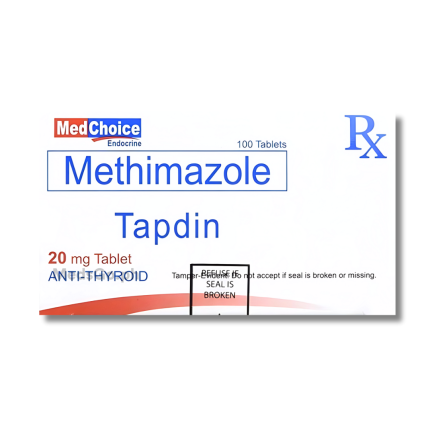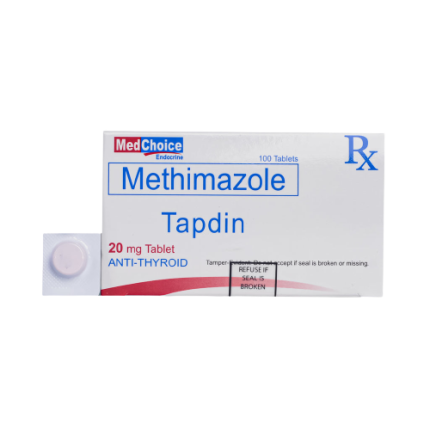All variations
Indications / Uses
TAPDIN Methimazole 20mg is used for the medical management of hyperthyroidism, including the treatment of Graves' disease and toxic multinodular goiter. It is effective in preparing patients for thyroidectomy or radioactive iodine therapy by restoring normal thyroid hormone levels. Additionally, it is utilized in the management of thyrotoxic crisis and for long-term stabilization when surgery or other definitive treatments are not suitable or preferred.
Formulation / Ingredients
TAPDIN Methimazole 20mg contains: Methimazole 20mg
Do I need prescription to buy TAPDIN Methimazole 20mg?
Yes, you need a prescription. But if you don't have one, you can get a free teleconsultation from MedsGo Physician. Just make an order and our Physician will call you back.
Side Effects
TAPDIN Methimazole 20mg common side effects include: skin rashes, itching, hair loss, and nausea or vomiting. More significant reactions can involve joint pain, muscle pain, or swelling. In rare cases, severe blood disorders like agranulocytosis or liver-related issues such as jaundice may occur, requiring immediate attention to any signs of infection or yellowing of the skin.
Directions and Dosage
- Adults (18+ years): Initially 15 mg to 60 mg daily, usually divided into 3 doses. Maintenance dosage is typically 5 mg to 15 mg daily.
- Kids 6–17 years: Initially 0.4 mg/kg daily divided into 3 doses. Maintenance dosage is approximately 0.2 mg/kg daily.
Maximum daily dosage for adults is 60 mg. Use in children should be based on body weight. Treatment duration often lasts 6 months to 2 years for long-term remission.
Contraindications
Avoid use if there is a history of hypersensitivity to the active ingredient or other thionamides. It is contraindicated in patients with severe pre-existing blood disorders, such as agranulocytosis or white blood cell deficiencies, and those with serious liver impairment or cholestasis.
Use in Pregnancy and Lactation
Potential for fetal harm exists during the first trimester; alternative treatments are often preferred during early pregnancy. It is excreted in breast milk and may affect the thyroid function of the nursing infant.
Special Precautions
- Monitor for symptoms like fever, sore throat, or malaise, which may indicate serious blood changes.
- Regular liver function tests are recommended to detect potential hepatotoxicity early.
- Dosage adjustments may be necessary if thyroid function tests indicate over-suppression.
Is it safe to take it with other medications?
Interactions can occur with anticoagulants, requiring more frequent monitoring of blood clotting times. Improvements in thyroid status may also change the required dosage of digitalis glycosides and beta-blockers.
How should I store it?
Keep in a dry place at temperatures not exceeding 30°C. Protect the tablets from direct light and moisture.
Used For
- Hyperthyroidism
Age
- 6 years & up
Features
- Methimazole
Reviews
No reviews found
Pharmacist answers to questions about TAPDIN Methimazole 20mg - 1 Tablet







